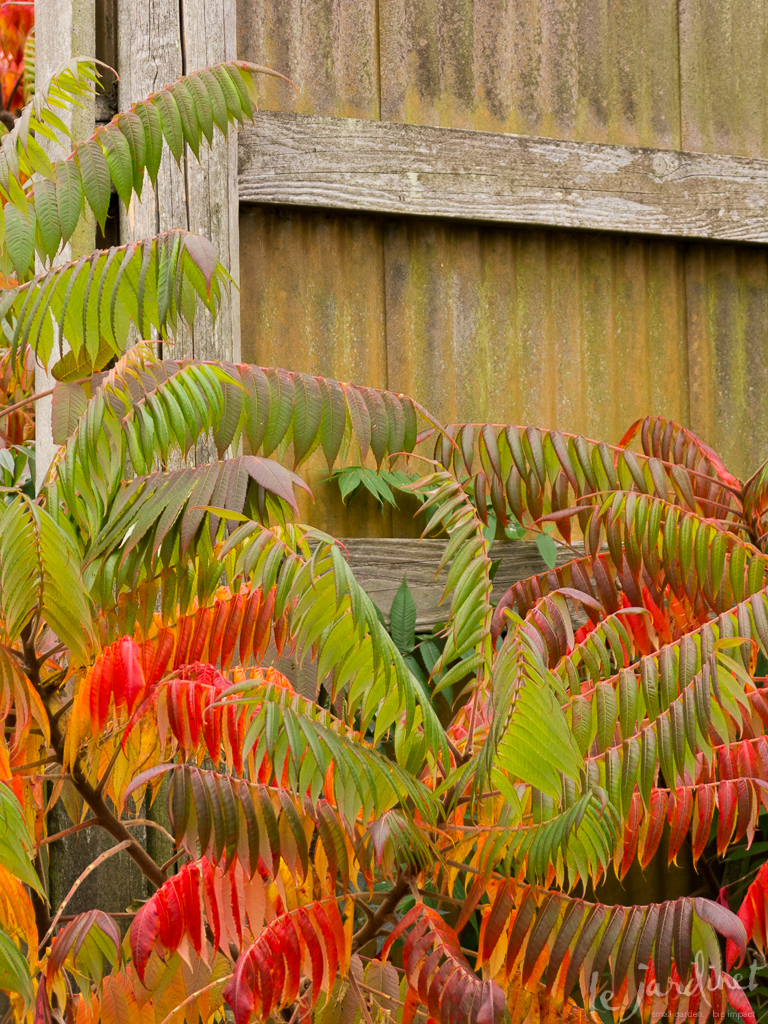The Pumpkin Color Palette
Pumpkin is 'IN'.
From spiced pumpkin lattes and cream cheese frosted muffins to the farm stands brimming with every shape and size of both edible and ornamental squash – there is no denying that pumpkin orange is the color and flavor of the season.
But look around and you'll see dazzling foliage in shades of pumpkin too – so I dedicate this post to the fashion conscious gardener. Or at least that is my excuse for playing with my new camera and taking oodles of pictures yesterday!
Fern leaf full-moon maple, syn. Full-moon maple (Acer japonicum 'Aconitifolium')
You'll find me underneath the tree……….. I learned some time ago that when planning a photo shoot I needed full foul weather gear (because nothing was going to stop me), hiking boots (I always seem to find the muddy spots) and a hat (spiders love spinning webs underneath trees). Well I forgot the hat but scrambled under this tree anyway – just look at that color!
I've always admired this tree in my friend's garden – the cut leaf is so delicate yet quite different from the typical Japanese maples and I can't recall any others with such vivid, almost bi-color foliage. After taking these pictures I may just have to find room for one.
Size; 15-30' tall and wide
Site; full sun to part shade
Hardiness; USDA zones 5-7
'Diane' witch hazel (Hammamelis x intermedia 'Diane')
Witch hazels are garden chameleons. In spring and summer they don't offer much – just green leaves on an average sort of bush. But come autumn – call the Fire Brigade! The foliage of Diane initially turns a remarkable stripy mix of purple green and orange as shown below.
As the leaves age they turn a wild shade of pumpkin orange – this floozy knows how to strut her stuff! Then just when you think the show is over, watch for Act 2 – coppery-red flowers.
Size; to 20' tall x 10' wide
Site; full sun or part shade
Hardiness; USDA zones 5-9
American Smoke Tree (Cotinus obovatus)
I've written several articles on smoke bushes (Cotinus sp.) both on this blog and Houzz , giving special mention to the purple Grace and the soft teal colored Old Fashioned, both of which I have in my own garden. The species shown here isn't nearly as showy during the rest of the year having rather ordinary blue-green leaves and a somewhat straggly shape but I have to admit its autumn show is far superior. This might be a good option for those gardeners preferring a more naturalistic landscape or one which focuses heavily on indigenous species (this is native to SE United States).
Size; 30' tall and wide
Site; full sun
Hardiness; USDA zones 4-8
Staghorn, sumac (Rhus typhina)
Am I about to recommend planting sumac in a garden? No – not unless you have a big piece of property and would like a small forest of them since they sucker freely. But this post is less about recommending plants than it is about sharing some great examples of fall color that I came across while travelling this week. Sumac is wonderful to enjoy in someone else's garden, or in this case, self seeding at will along an old barn. The fiery show will continue for several weeks with flames in pumpkin orange, tomato red and lime green – delicious.
Size; 15-25' tall and 20-30' wide
Site; Full sun, part shade
Hardiness; USDA zones 3-8
This is just a small sampling of the early season show. How many shades of pumpkin do you have in your garden right now?







Very nice post and puts one in an autumnal, relaxed mood. The second image of 'Diane' is a firecracker of color impact. If I only had the room to add one to my gardening space,
Glad you enjoyed the post Patrick
Have just planted a Cotinus 'Grace' on my alkaline soil and hope that the autumn colour is going to be spectacular, together with my lovely Cornus e. 'Red Cascade' which obliges every autumn with its deep rosy seed pods and red foliage. Alas, I am not lucky with Hamamelis, they prefer acidic soil conditions. Well, I suppose one cannot have everything. As always, I greatly enjoy your postings.
I wonder if it is worth amending an area with ericaceous compost so you can grow witch hazel? We alwasy want what we can't have don't we?!
I am not surprised that you and I share some of the same plants noted for fall color. Every day I go out to see if my Aconitifolium is displaying its colors yet, but so far just around the edges. The same with my American smoke tree and my witch hazel. But it won't be long! Meanwhile, I am enjoying a planter full of pumpkins and gourds. Happy fall!
So funny that we enjoy exactly the same plants. No wonder I love my visual strolls around your garden on your blog!
Thanks for a wonderful post. I so greatly enjoy this orange time with Disanthus c. & the Parotia p. (nicknamed Party Girl just for Autumn).
Merle in Washougal
Thanks for the photos you sent me Merle – I've often been tempted by the Disanthus!
You have highlighted some of my favorites for fall color. If you have room for it, sumac is one of my favorite shrubs for year round interest and its fruit is the last available food source for birds in winter.
Hi Carolyn, I do love Sumac but it loves our PNW soils a bit TOO much! I do use Tiger Eyes in containers but let loose and I'd have a forest.
I do have a photo of Sumac in this blog post but it was OK growing wild by the barn in this nursery as it had plenty of space.